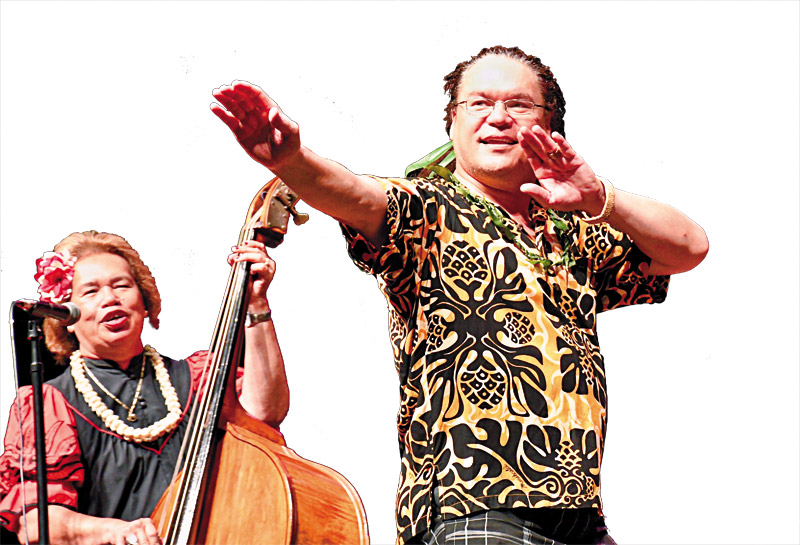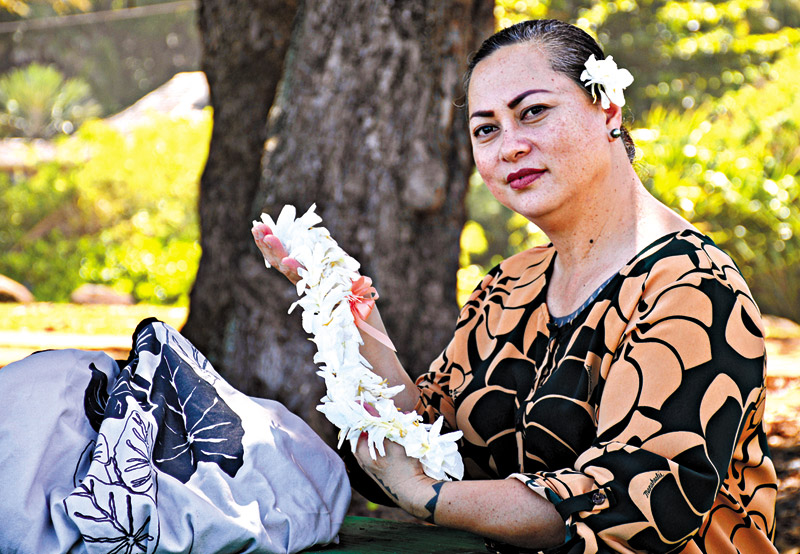The Mele Of Mokihana
MÄlie Foundation’s scholarship program helps people like Naomi Taboniar create culturally significant mele, which the public can enjoy at the Mokihana Festival now through Sept. 29.
The Mokihana Festival — scheduled for Sept. 23-29 — is more than just a celebration of the arts. Under the stewardship of MÄlie Foundation, the event serves as an important page in the long story of Hawaiian language, culture, perseverance and perpetuation.
In 1984, James ‘Ekolu PÄnui, Larry Keli‘i Duhaylongsod and Nathan Liberato Kahikolu Kahape‘a Kalama started the first Kaua‘i Composers Contest and Concert with $300 (thanks to a grant from Hasegawa Komuten Relations Board) in their pockets.
The first concert was held at Kaua‘i War Memorial Convention Hall and hosted about 50 guests. They made a profit of $5.
“That was a sign for Uncle Nathan (Kalama) to continue with it because he wasn’t in the red,” laughs kumu hula Maka Herrod, who took over the festival from his uncle nine years ago.
Today, in addition to the original composers’ competition, the weeklong festival features 70 events, including educational workshops, a keiki music competition, a lei competition, cultural presentations, and hula competitions with 11 hula hÄlau from Washington, Japan, O‘ahu, Maui and the Garden Isle.
This year’s theme is NÄ Mo‘olelo, which highlights the stories of Hawai‘i.
“We are encouraging people to write so that the next generation and the generation after would know through the songs what was happening during this era,” Herrod explains. “The Hawaiian language where it is now from 30 years ago, it’s amazing. Ever since I took over, we didn’t really have an education piece and that’s very important to me.”
Incorporating educational elements into the festival also speaks to the foundation’s work in supporting the learning of Hawaiian language and culture through its scholarship program.
“The MÄlie Foundation scholarship program came into place because at that time what Uncle (Kalama) wanted was to help those children learn the Hawaiian language because there was a time when we couldn’t, when the language was banned in school and speaking it in public, so because of that he wanted a scholarship to help people who wanted to learn the Hawaiian language,” Herrod continues.

Mokihana Festival’s Maka Herrod performs a hula, while Haunani Kaui accompanies on the upright bass.
One such scholarship recipient is composer contestant Naomi Taboniar, who embodies the heart of the foundation and festival.
“I started dancing hula in sixth grade, and I’d been with Aunty Kapu (kumu hula Kapu Kinimaka-Alquiza) since 1986,” she explains.
“Then in 2006, I was asked by my kumu to represent our hÄlau in the Mokihana. It was an honor for me because I was much older and I hadn’t even thought about entering, and I was very surprised but I won.”
Taboniar’s story with the festival doesn’t end there, though.
“When my children were grown, I was ready to get back into a career, but it was very hard to find a job with a 12-, 13-year gap, so my husband said, ‘Why don’t you go back to school?’
“I never thought of going back to school at a later stage in my life, but that is when I sought resources and found the MÄlie Foundation scholarship. I was very honored and blessed to have that assistance for five consecutive semesters.”
To complete her studies and receive her Hawaiian Studies Academic Subject Certificate, Taboniar took “Hawaiian Music in Transition,” taught by kumu Dennis Chun.
For her final class project, she had to compose a mele — her first attempt at the endeavor. She and her husband took a trip up to KÅke‘e, and Taboniar was floored by Kaua‘i’s natural beauty, untouched nature and peace.
“I’m not experienced (in composing), but the process, the thoughts that I could put into writing, is very beautiful when you bring it to life,” she says. “Who knew that words on a paper could be brought to life and shared?”
The mele was the one that led her to this year’s composers competition and began during one of her final conversations with her father. She remembers him sharing that his favorite lei was ginger.
Taboniar wanted to compose a mele in honor of her father, but as she says, for some reason she just couldn’t finish it.
“Months later I had an experience sewing a ginger lei,” she says. “Thoughts of my dad, I remembered him as I’m sewing the lei, smelling it, sewing each delicate flower, preparing it from the first stage as a bud.
“From that experience I completed my mele. My father remembered every September, on his birthday, his mother would make him a ginger lei. This is him passing that story on, sharing this memory with my generation, and I’ll be able to share this memory with my grandchildren’s generation.”
For more information on MÄlie Foundation, its scholarship program or the 2018 Mokihana Festival, visit maliefoundation.org.






